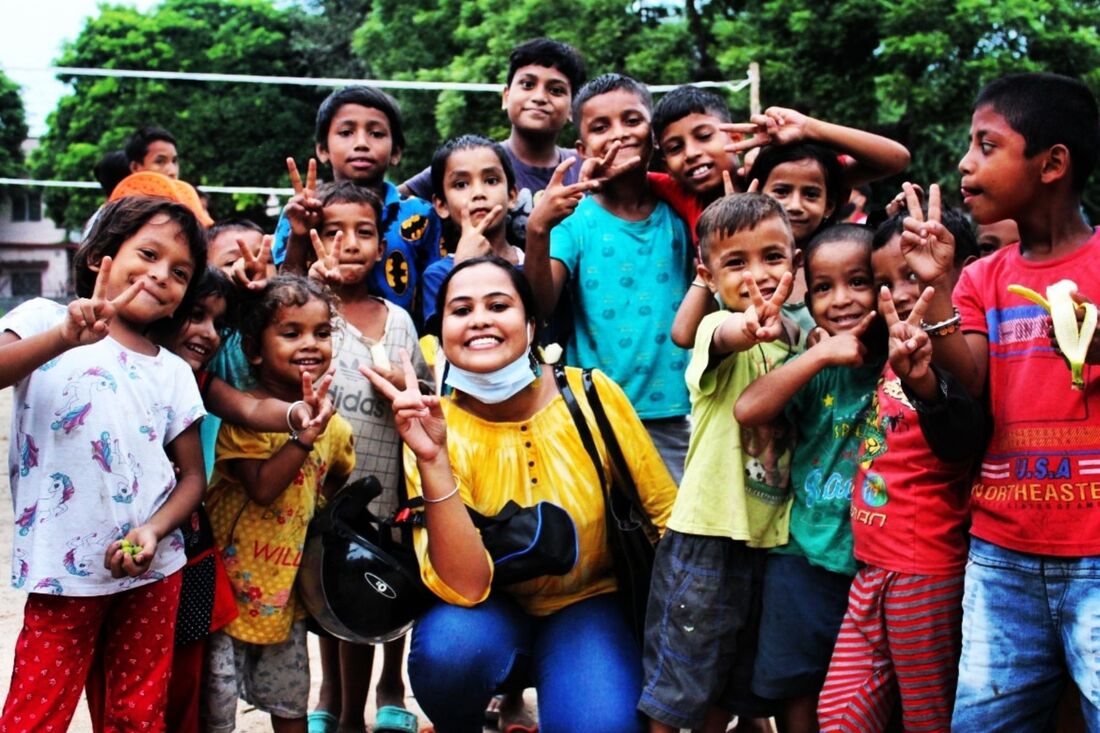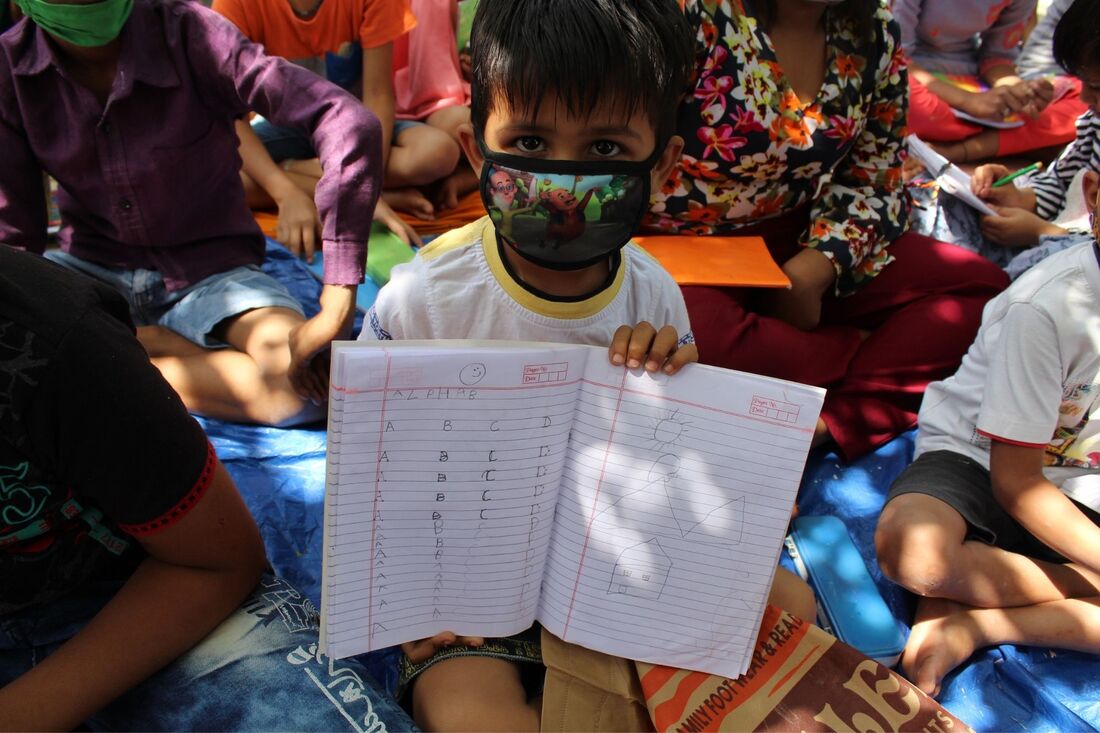Learning has been disrupted for more than 1.5 billion children and youth by the COVID-19 pandemic.
Those who were marginalized before the pandemic are now at a higher risk. Intersectionality with poverty, gender, ethnicity, age, disability or other identities can result in multiple forms of discrimination and exclusion from online education which can be called the digital divide.
As per WEF report, 320 million learners in India have been adversely affected by the COVID-19 pandemic as they cannot rapidly shift to e-learning. Students who drop out of education start working as child laborers and are exposed to various social evils. Girls are either married off or sold. The government of India has initiatives for the education and nutrition of these children. However, many parents are either unaware of these or not motivated to educate their children.
We, at Ladli Foundation, have collaborated with the BYJU’s e-learning app (globally renowned and India’s leading e-learning and digital education provider) to provide free access to secondary education to one lakh marginalized students. Our project focuses on families with three or more children (especially girl children). We will work with the most vulnerable families and ensure that each tablet benefits the whole family.
Having special consultative status in the United Nations ECOSOC, a statement submitted by the Ladli Foundation has been published in the “United Nations 2021 High-Level Political Forum on COVID Resilience and Recovery” stating that “COVID -19 pandemic has been an instrument of change, unexpected transformations and awakening at an individual level. The idea of resilience and recovery from this pandemic is not something that can be supported with sheer thoughts and beliefs but has to do much more with the idea of real-time implementation and execution of initiatives which support holistic development through technological acceleration.” Hence we believe that next-gen technologies and digital learning play a significant role in achieving all the UNSDGs by 2030.
As per WEF report, 320 million learners in India have been adversely affected by the COVID-19 pandemic as they cannot rapidly shift to e-learning. Students who drop out of education start working as child laborers and are exposed to various social evils. Girls are either married off or sold. The government of India has initiatives for the education and nutrition of these children. However, many parents are either unaware of these or not motivated to educate their children.
We, at Ladli Foundation, have collaborated with the BYJU’s e-learning app (globally renowned and India’s leading e-learning and digital education provider) to provide free access to secondary education to one lakh marginalized students. Our project focuses on families with three or more children (especially girl children). We will work with the most vulnerable families and ensure that each tablet benefits the whole family.
Having special consultative status in the United Nations ECOSOC, a statement submitted by the Ladli Foundation has been published in the “United Nations 2021 High-Level Political Forum on COVID Resilience and Recovery” stating that “COVID -19 pandemic has been an instrument of change, unexpected transformations and awakening at an individual level. The idea of resilience and recovery from this pandemic is not something that can be supported with sheer thoughts and beliefs but has to do much more with the idea of real-time implementation and execution of initiatives which support holistic development through technological acceleration.” Hence we believe that next-gen technologies and digital learning play a significant role in achieving all the UNSDGs by 2030.
This is an action-research project conceptualized to enable access to digital education for marginalized students by providing them free refurbished digital devices with loaded e-learning content, material, and 3 years premium subscription of BYJU’s app.
The concept has also added some organizations' critical expertise and essential features for sensitizing the students on various critical issues such as gender sensitization, menstrual health & hygiene, WASH, sexual abuse, child rights, prevention from drugs/substance abuse, and deadly transferable diseases/STDs through in different community workshops, fun activities, and reward-based competitions.
The project also focuses on motivating the parents of the students to support them in completing their education and not involve them in child labor.
We start with basic research work and data analysis. This includes a survey and door-to-door registration of beneficiaries. For this purpose, we recruit volunteers for each area/number of families i.e., cluster. Each cluster has a team, coordinators, community leaders, and student monitors. Then, we distribute the devices and give basic training. We conduct monthly workshops with students and parents; quarterly reward-based competitions and annual performance incentives. In the next step, we identify the challenges faced by students in accessing education and the impact of digital education. In our monitoring process, we analyze the outcome of these activities. The team has regular conversations with volunteers and beneficiaries in a planned manner. We also conduct seminars with local elected public representatives, concerned government departments, UN agencies, and other stakeholders.
The concept has also added some organizations' critical expertise and essential features for sensitizing the students on various critical issues such as gender sensitization, menstrual health & hygiene, WASH, sexual abuse, child rights, prevention from drugs/substance abuse, and deadly transferable diseases/STDs through in different community workshops, fun activities, and reward-based competitions.
The project also focuses on motivating the parents of the students to support them in completing their education and not involve them in child labor.
We start with basic research work and data analysis. This includes a survey and door-to-door registration of beneficiaries. For this purpose, we recruit volunteers for each area/number of families i.e., cluster. Each cluster has a team, coordinators, community leaders, and student monitors. Then, we distribute the devices and give basic training. We conduct monthly workshops with students and parents; quarterly reward-based competitions and annual performance incentives. In the next step, we identify the challenges faced by students in accessing education and the impact of digital education. In our monitoring process, we analyze the outcome of these activities. The team has regular conversations with volunteers and beneficiaries in a planned manner. We also conduct seminars with local elected public representatives, concerned government departments, UN agencies, and other stakeholders.


